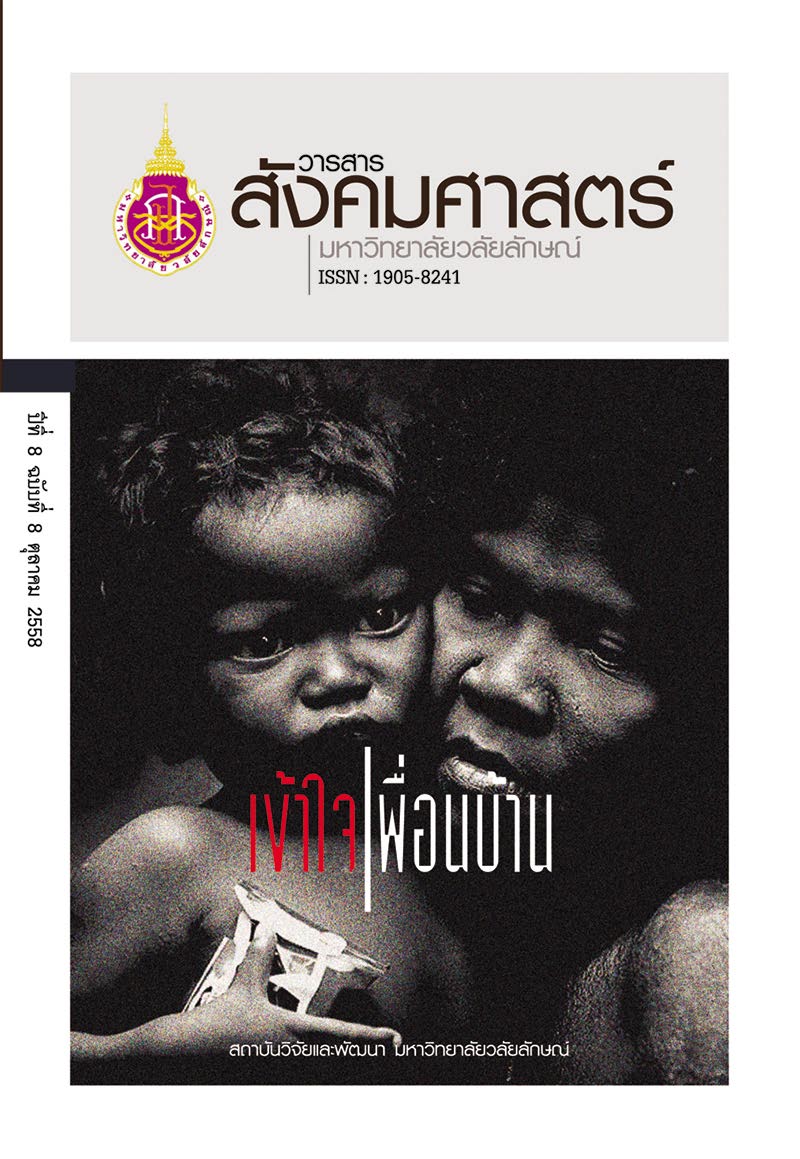Memories of Phii Ka Accusations in Northern Thailand Assimilation into Matrilineal Traditions (in Thai)
Main Article Content
Abstract
Toward the end of the nineteenth century and toward the beginning of the twentieth century, foreign residents and visitors in what is now northern Thailand were reporting that there was a high number of incidents in which people were being accused of being “witches.” These “witches” did not actually perform any magical rituals, but rather were people inhabited by malicious spirits that the local people called phi ka. These phi ka were caused the people they inhabited to become inherently dangerous to those around them, often without the inhabited person being aware of the danger. Over the past 100 years, the people of northern Thailand have reportedly talked less and less of phi ka, but toward the end of the nineteenth century the local people were greatly afraid of phi ka. The people that the spirits were thought to inhabit might be beaten by their neighbors or driven out of their homes and villages. Later on, in the 1970s and 1980s, Western-trained anthropologists began studying the lives and local cultural histories of the farmers and rural villagers of northern Thailand. The researchers of this generation reported that the northern villagers of that time thought that the condition of being infested by a phi ka was something that was passed down in the matrilineal line, the same as was the case with responsibilities to care for the guardian ancestral spirits. But the data from those who had been in the north at the end of the nineteenth century showed that the people of that time appeared to think that phi ka could be passed on by multiple means, not just through the matriline. Therefore, the author proposes that toward the beginning of the twentieth century people began having less and less direct experience of phi ka activity, and as a result the villagers’ memories of the manner of phi ka inheritance became gradually assimilated with the group responsibilities toward matrilineal guardian spirits (phi puu yaa taa yaai). While the author was studying this matter, he came across a Thai-language article by Dr. Anan Ganjanapan that suggests a set of three historical stages by which this process might have happened.
ผีกะในภาคเหนือของไทยตอนปลายคริสต์ศตวรรษที่ 19 สืบเชื้อสายตามตระกูลแม่จริงหรือไม่
ในภาคเหนือของประเทศไทยในช่วงตอนปลายของคริสต์ศตวรรษที่ 19 และตอนต้นของคริสต์ศตวรรษที่ 20 มีคนต่างชาติรายงานว่าในละแวกนั้นมีการกล่าวหาว่าคนอื่นเป็น “พ่อมด”หรือ “แม่มด” (witches) คนที่ถูกกล่าวหาว่าเป็น“แม่มด”เหล่านี้ไม่ได้ทำเวทมนต์คาถาแต่อย่างใด แต่เป็นคนที่มีผีร้ายเข้าสิง ซึ่งคนพื้นเมืองนั้น เรียกว่า “ผีกะ” ชึ่ง “ผีกะ”เหล่านี้ทำให้คนที่ผีสิงอยู่นั้นเป็นอันตรายต่อคนอื่นโดยอัตโนมัติในช่วง 100 ปีที่ผ่านมาชาวบ้านภาคเหนือได้พูดถึงผีกะน้อยลง แต่ตอนปลายคริสต์ศตวรรษที่19 คนพื้นเมืองจะกลัวผีกะมาก และคนที่ชาวบ้านคิดว่ามีผีกะสิงอยู่อาจจะถูกทำร้ายจากเพื่อนบ้านหรือถูกไล่ออกจากหมู่บ้าน ต่อมาในช่วง คริสต์ศตวรรษที่ 1980 (พุทธทศวรรษ ที่ 2520) มีนักมานุษยวิทยาจากตะวันตก (และคนไทยที่ได้รับการอบรมทางด้านมานุษยวิทยาในมหาวิทยาลัยตะวันตก) เริ่มศึกษาวิถีชีวิตและประวัติศาสตร์ทางวัฒนธรรมของชาวบ้านซึ่งเป็นชาวนาภาคเหนือ และนักวิชาการเหล่านี้พบว่าชาวบ้านภาคเหนือต่างคิดว่า ผู้ที่ถูกผีกะสิงอยู่นั้นเกิดจากการสืบเชื้อสายจากแม่ถึงลูก เหมือนกับวิธีสืบทอดความรับผิดชอบการบูชาผีปู่ย่าตายาย แต่ข้อมูลจากผู้เขียนที่ได้อยู่ในภาคเหนือช่วงตอนปลายคริสต์ศตวรรษที่ 19 แสดงให้เห็นว่า คนในสมัยนั้นอาจจะคิดว่าผีกะสืบลงมาด้วยวิธีที่หลากหลาย เหตุฉะนั้นผู้เขียนเสนอว่า ในตอนต้นคริสต์ศตวรรษที่ 20 การที่คนท้องถิ่นมีประสบการณ์ส่วนตัวกับเรื่องผีกะน้อยลงเรื่อย ๆ ทำให้ชาวบ้านค่อย ๆ เปลี่ยนความทรงจำเกี่ยวกับผีกะในทางที่ทำให้วิธีสืบทอดเป็นเหมือนวิธีสืบทอดของผีปู่ย่าตายายมากขึ้น ๆ ในระหว่างที่ผู้เขียนกำลังศึกษาเรื่องนี้อยู่ได้พบบทความบทหนึ่งของอาจารย์อานันท์ กาญจนพันธุ์ ที่แสดงภาพวิเคราะห์ทางด้านประวัติศาสตร์ที่อาจจะแสดงถึงขั้นตอนสำคัญ ๆ ที่อาจจะเป็นเหตุผลทางด้านระบบสังคมที่สำคัญในการทำให้ความเชื่อนี้เปลี่ยนแปลงไป
Article Details
Copyright: CC BY-NC-ND 4.0


